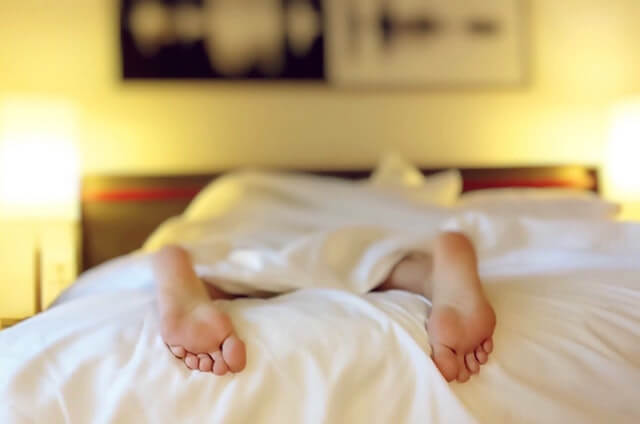Parents! Science Says Put Your Teenagers to Bed Early
8 years ago | Sleep
By Joy Stephenson-Laws, JD, Founder
We all know we need to breathe in oxygen, absorb nutrients from the food we eat and drink water in order to live healthily. But there is yet another major necessity of life - sleep. It is so important, that on average we spend about one-third of our lives sleeping.
“Sleep is food for the brain. During sleep, important body functions and brain activity occur,” according to the National Sleep Foundation (NSF).
“If sleep is cut short, the body doesn’t have time to complete all of the phases needed for muscle repair, memory consolidation and release of hormones regulating growth and appetite. Then we wake up less prepared to concentrate, make decisions, or engage fully in school and social activities.”
As a parent, if you notice that your teen is struggling to get out of bed on school mornings it may be because he or she did not get enough sleep. Ideally, teens needs nearly 10 hours of sleep each night.
A recent nine-night sleep study involving 34 adolescents (between the ages of 15 to 17), found evidence that around 9.35 hours of sleep is needed “to maintain optimal sustained attention performance.”
(Adults need about seven hours of sleep).
According to a report on the study, “[a]s soon as teens get less than nine hours sleep, attention deficits accumulate and jetlag-type behaviour starts to kick in – putting them at risk of poor performance at school and even personal injury through accidents, including car crashes if they drive.”
Just recently, a 17-year-old died in a car crash after dozing off at the wheel.
Reportedly, “drowsy driving” can be a risk to anyone, and it is the cause of at least 100,000 auto crashes each year
A lack of sleep may also weaken the immune system. Many studies show that “when sleep deprived people are given a vaccine, there is a lower antibody response and if you expose sleep deprived people to a rhinovirus they are more likely to get the virus."
Not getting enough sleep may also lead to weight gain. Sleep affects the levels of two hormones, leptin and ghrelin, which control feelings of hunger and fullness. Leptin is the hormone that tells your brain you have had enough to eat. Ghrelin is the appetite stimulant and, unfortunately, a lack of sleep causes reduced leptin levels and increased ghrelin levels.
The National Sleep Foundation cited one study which reported that only 15% of teens sleep for 8 1/2 hours on school nights.
And the ‘nine-night sleep study’ suggests that young people who do not get enough sleep may find that their sleep patterns get worse over time. So this means they are more likely to go from being a sleep-deprived child to a sleep-deprived adult!
So your child would need to be in bed by 9:30 p.m. if he has to be up at 6:30 a.m. in order to make it to school on time. And if you factor in that it usually takes time to wind down and nod off to sleep once he is in bed, your child may have to go to bed even earlier to get the recommended nine hours.
As a parent of former teenagers, I realize this can be difficult because one of the biggest culprits for sleep deprivation in our kids is the cell phone and other technological devices. Looking at your phone, television or computer, particularly before bedtime, can affect the ability to get good quality sleep. These devices emit a blue light that may slow down the production of melatonin, the sleep hormone that affects your circadian rhythm.
So how can you be proactive?
- Talk to your children about the importance of avoiding these electronic devices immediately before bedtime. It might not even be a bad idea to get a ‘fun,’ old school alarm clock for their bedroom, so they do not have to depend on the cell phone to wake up in the morning.
- Take the time to discuss with them the dangers of not getting enough sleep. They may be more receptive if they understand that the lack of sleep is a health-related matter and not something that their parents would love to see them do to stay out of trouble.
- Be involved in their schedule to ensure they leave enough time for sleep. Many teens and young people may tend to be involved in too many activities, like advanced placement classes, sports, debate teams and other clubs, part-time jobs, etc. And as parents we may think, “they are young and can handle it.” But the truth is we need to take sleep time into consideration when selecting the activities that our children are involved in, because sleep is that important.
- Look for signs of fatigue in your child, like difficulty getting them out of bed in the morning, and determine if they need to lighten their academic and other workloads a bit. You especially want to make them aware of the need for adequate sleep before they go off to college, where they will be living on their own and you will have essentially no control.
- Finally, nutrition may play a huge role in sleep duration and quality. There are essential nutrients that can help with getting good sleep. These include iron, magnesium and calcium. There are even certain foods that may enhance our ability to get quality sleep such as cherries, which contain melatonin - a hormone associated with good sleep. Read more about nutrition and sleep here.
Enjoy your healthy life!
The pH professional health care team includes recognized experts from a variety of health care and related disciplines, including physicians, attorneys, nutritionists, nurses and certified fitness instructors. This team also includes the members of the pH Medical Advisory Board, which constantly monitors all pH programs, products and services. To learn more about the pH Medical Advisory Board, click here.







